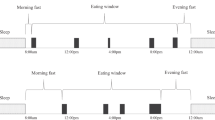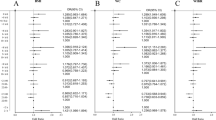Abstract
Background/Objectives
Although regular breakfast consumption is associated with various health benefits, many adolescents skip this meal, particularly those with shorter sleep durations. In order to better understand the association between sleep duration and breakfast consumption among youth, we analyzed the association between weekday morning tiredness and daily breakfast consumption in adolescents, and explored the mediating role of morning tiredness in the association between sleep duration and daily breakfast consumption on weekdays.
Subjects/Methods
The “Health Behaviour in School-aged Children” survey conducted in 2018 in French-speaking Belgian schools provided data (n = 8444 11–20-year-old adolescents) on bed- and wake-up times, and on the frequency of breakfast consumption and morning tiredness on weekdays. Multivariable logistic regressions and mediation analyses assessed the association, on weekdays, of morning tiredness (≥4 school mornings a week vs. less) and sleep duration (hours), with daily breakfast consumption, and the mediating role of morning tiredness.
Results
Feeling tired ≥4 school mornings a week was associated with lower odds of daily breakfast consumption on weekdays (aOR = 0.77 (95% CI 0.69–0.86)). In turn, on weekdays, sleep duration was positively associated with daily breakfast consumption (aOR = 1.29 (95% CI 1.23–1.36)), even after adjustment for morning tiredness (aOR = 1.28 (95% CI 1.21–1.35)). Morning tiredness only explained 4.9% of the association between sleep duration and daily breakfast consumption.
Conclusion
Our findings suggest that in adolescents, sleep duration and morning tiredness are independent correlates of daily breakfast consumption on weekdays.
This is a preview of subscription content, access via your institution
Access options
Subscribe to this journal
Receive 12 print issues and online access
$259.00 per year
only $21.58 per issue
Buy this article
- Purchase on Springer Link
- Instant access to full article PDF
Prices may be subject to local taxes which are calculated during checkout


Similar content being viewed by others
Data availability
Data and code used in this study are available on request to the principal investigators.
References
Blondin SA, Anzman‐Frasca S, Djang HC, Economos CD. Breakfast consumption and adiposity among children and adolescents: an updated review of the literature. Pediatr Obes. 2016;11:333–48.
Barr SI, DiFrancesco L, Fulgoni VL. Breakfast consumption is positively associated with nutrient adequacy in Canadian children and adolescents. Br J Nutr. 2014;112:1373–83.
Coulthard JD, Palla L, Pot GK. Breakfast consumption and nutrient intakes in 4–18-year-olds: UK National Diet and Nutrition Survey Rolling Programme (2008–2012). Br J Nutr. 2017;118:280–90.
Mielgo-Ayuso J, Valtueña J, Cuenca-García M, Gottrand F, Breidenassel C, Ferrari M, et al. Regular breakfast consumption is associated with higher blood vitamin status in adolescents: the HELENA (Healthy Lifestyle in Europe by Nutrition in Adolescence) Study. Public Health Nutr. 2017;20:1393–404.
Rampersaud GC, Pereira MA, Girard BL, Adams J, Metzl JD. Breakfast habits, nutritional status, body weight, and academic performance in children and adolescents. J Am Diet Assoc. 2005;105:743–60.
Cooper SB, Bandelow S, Nevill ME. Breakfast consumption and cognitive function in adolescent schoolchildren. Physiol Behav. 2011;103:431–9.
Adolphus K, Lawton CL, Champ CL, Dye L. The effects of breakfast and breakfast composition on cognition in children and adolescents: a systematic review. Adv Nutr. 2016;7:590S–612S.
Blasetti A, Franchini S, Castorani V, Comegna L, Fornari E, Daniele F, et al. Skipping breakfast is associated with an atherogenic lipid profile in overweight and obese prepubertal children. Int J Endocrinol. 2020;2020:1849274.
Bel S Enquête de consommation alimentaire 2014-2015. Rapport 1. Régularité des repas. Brussels, Belgium: WIV-ISP; 2015. https://fcs.wiv-isp.be/nl/Gedeelde%20%20documenten/FRANS/MF_FR.pdf. Accessed 13 April 2020.
Lazzeri G, Ahluwalia N, Niclasen B, Pammolli A, Vereecken C, Rasmussen M, et al. Trends from 2002 to 2010 in daily breakfast consumption and its socio-demographic correlates in adolescents across 31 countries participating in the HBSC study. PLoS ONE. 2016;11:e0151052.
Inchley J, Currie D, Budisavljevic S, Torsheim T, Jåstad A, Cosma A, et al., editors. Spotlight on adolescent health and well-being. Findings from the 2017/2018 Health Behaviour in School-aged Children (HBSC) survey in Europe and Canada. International report. Volume 1. Key findings. Copenhagen, Denmark: WHO Regional Office for Europe; 2020. https://apps.who.int/iris/bitstream/handle/10665/332091/9789289055000-eng.pdf. Accessed 30 July 2021.
Wijtzes AI, Jansen W, Jaddoe VW, Franco OH, Hofman A, van Lenthe FJ, et al. Social inequalities in young children’s meal skipping behaviors: the generation R study. PloS ONE. 2015;10:e0134487.
Hallström L, Vereecken CA, Ruiz JR, Patterson E, Gilbert CC, Catasta G, et al. Breakfast habits and factors influencing food choices at breakfast in relation to socio-demographic and family factors among European adolescents. The HELENA Study. Appetite. 2011;56:649–57.
Pearson N, Biddle SJ, Gorely T. Family correlates of breakfast consumption among children and adolescents. A systematic review. Appetite. 2009;52:1–7.
Gebremariam MK, Henjum S, Hurum E, Utne J, Terragni L, Torheim LE. Mediators of the association between parental education and breakfast consumption among adolescents: the ESSENS study. BMC Pediatr. 2017;17:61 https://doi.org/10.1186/s12887-017-0811-2
Chaput JP. Sleep patterns, diet quality and energy balance. Physiol Behav. 2014;134:86–91.
Chaput J, Dutil C. Lack of sleep as a contributor to obesity in adolescents: impacts on eating and activity behaviors. Int J Behav Nutr Phys Act. 2016;13:103 https://doi.org/10.1186/s12966-016-0428-0
Moore M, Meltzer LJ. The sleepy adolescent: causes and consequences of sleepiness in teens. Paediatr Respir Rev. 2008;9:114–21.
Tynjala J, Kannas L, Levalahti L. Perceived tiredness among adolescents and its association with sleep habits and use of psychoactive substances. J Sleep Res. 1997;6:189–98.
Due P, Holstein BE, Lynch J, Diderichsen F, Gabhain SN, Scheidt P, et al. Bullying and symptoms among school-aged children: international comparative cross sectional study in 28 countries. Eur J Public Health. 2005;15:128–32.
Scheidt P, Overpeck MD, Wyatt W, Aszmann A. Adolescents’ general health and well-being. In: Currie C, Hurrelmann K, Settertobulte W, Smith R, Todd J, editors. Health and health behavior among young people. Copenhagen, Denmark: World Health Organization. 2000, pp. 24–38.
Findlay SM. The tired teen: a review of the assessment and management of the adolescent with sleepiness and fatigue. Paediatr Child Health. 2008;13:37–42.
Lebacq T, Pedroni C, Desnouck V, Holmberg E, Moreau N, Dujeu M, et al. Alimentation, activité physique, sédentarité et sommeil. Comportements, santé et bienêtre des élèves en 2018 – Enquête HBSC en Belgique francophone. Service d’Information, Promotion, Éducation Santé (SIPES), École de Santé Publique. Brussel, Belgium: Université libre de Bruxelles; 2019. http://sipes.ulb.ac.be/. Accessed 19 May 2020.
Inchley J, Currie D, Cosma A, Samdal O. Health Behaviour in School-Aged Children (HBSC) study protocol: background, methodology and mandatory items for the 2017/2018 survey. http://www.hbsc.org/methods/. Accessed 9 October 2020.
Torsheim T, Cavallo F, Levin KA, Schnohr C, Mazur J, Niclasen B, et al. Psychometric validation of the revised family affluence scale: a latent variable approach. Child Indic Res. 2016;9:771–84. Group FDSS
Kohler U, Karlson KB, Holm A. Comparing coefficients of nested nonlinear probability models. Stata J. 2011;11:420–38.
Kronholm E, Puusniekka R, Jokela J, Villberg J, Urrila AS, Paunio T, et al. Trends in self‐reported sleep problems, tiredness and related school performance among Finnish adolescents from 1984 to 2011. J Sleep Res. 2015;24:3–10.
Gariépy G, Janssen I, Sentenac M, Elgar FJ. School start time and sleep in Canadian adolescents. J Sleep Res. 2017;26:195–201.
Shaw ME. Adolescent breakfast skipping: an Australian study. Adolescence 1998;33:851–61.
Mullan B, Wong C, Kothe E, O’Moore K, Pickles K, Sainsbury K. An examination of the demographic predictors of adolescent breakfast consumption, content, and context. BMC Public Health. 2014;14:264 https://doi.org/10.1186/1471-2458-14-264
Golley RK, Maher CA, Matricciani L, Olds TS. Sleep duration or bedtime? Exploring the association between sleep timing behaviour, diet and BMI in children and adolescents. Int J Obes. 2013;37:546–51. https://doi.org/10.1038/ijo.2012.212
Ogilvie RP, Lutsey PL, Widome R, Laska MN, Larson N, Neumark-Sztainer D. Sleep indices and eating behaviours in young adults: findings from Project EAT. Public Health Nutr. 2018;21:689–701.
Grummon AH, Sokol RL, Lytle LA. Is late bedtime an overlooked sleep behaviour? Investigating associations between sleep timing, sleep duration and eating behaviours in adolescence and adulthood. Public Health Nutr. 2021;24:1671–7.
Fleig D, Randler C. Association between chronotype and diet in adolescents based on food logs. Eat Behav. 2009;10:115–8.
Boschloo A, Ouwehand C, Dekker S, Lee N, De Groot R, Krabbendam L, et al. The relation between breakfast skipping and school performance in adolescents. Mind Brain Educ. 2012;6:81–88.
Roßbach S, Diederichs T, Nöthlings U, Buyken AE, Alexy U. Relevance of chronotype for eating patterns in adolescents. Chronobiol Int. 2018;35:336–47.
Randler C. The concept of chronotype in eating behaviors. In: Preedy V, Watson R, Martin C, editors, Handbook of behavior, food and nutrition. Springer: New York, USA; 2011, pp. 771–82.
Matricciani L. Subjective reports of children’s sleep duration: does the question matter? A literature review. Sleep Med. 2013;14:303–11.
St-Onge MP, Mikic A, Pietrolungo CE. Effects of diet on sleep quality. Adv Nutr. 2016;7:938–49.
Jacka FN, Kremer PJ, Berk M, de Silva-Sanigorski AM, Moodie M, Leslie ER, et al. A prospective study of diet quality and mental health in adolescents. PloS One. 2011;6:e24805.
Whitaker RC, Dearth-Wesley T, Herman AN, Oakes JM, Owens JA. A quasi-experimental study of the impact of school start time changes on adolescents’ mood, self-regulation, safety, and health. Sleep Health. 2019;5:466–9.
Acknowledgements
The authors thank the schools and students for their participation in the French-speaking Belgian Health Behaviour in School-aged Children (HBSC) survey. They also thank the HBSC international coordination center (University of St Andrews, United Kingdom) and the HBSC data management center (University of Bergen, Norway) for their scientific support, as well as Amélie Bellanger, Omer Cimpaye, Véronique Desnouck, Morgane Eggen, Estelle Méroc and Nathalie Moreau (SIPES, Université libre de Bruxelles, Belgium) for their collaboration in data collection, cleaning and management.
Funding
This research was funded by the Birth and Children Office (ONE), the Walloon Region, and the French Community Commission.
Author information
Authors and Affiliations
Contributions
TL contributed to the data collection, conceptualized the study, determined the methodology used, conducted the analyses and wrote the original draft. KC conceptualized the study, validated the methodology used, reviewed and edited the draft. CP and MD contributed to the data collection, reviewed and edited the draft. EH reviewed and edited the draft. All authors have read and agreed to the published version of the manuscript.
Corresponding author
Ethics declarations
Competing interests
The authors declare no competing interests.
Ethical approval
The 2018 HBSC survey was approved by the Ethics Review Committee of the Faculty of Psychology (Université libre de Bruxelles, ULB) and the regional education boards of the school networks. The adolescents and their parents were fully informed about the study requirements. Students could refuse to complete the questionnaire without any formal procedure. Parents could refuse their child’s participation by filling in a form provided together with the information documents.
Additional information
Publisher’s note Springer Nature remains neutral with regard to jurisdictional claims in published maps and institutional affiliations.
Supplementary information
Rights and permissions
About this article
Cite this article
Lebacq, T., Holmberg, E., Pedroni, C. et al. Weekday sleep duration and morning tiredness are independent covariates of breakfast skipping in adolescents. Eur J Clin Nutr 76, 1403–1408 (2022). https://doi.org/10.1038/s41430-022-01117-2
Received:
Revised:
Accepted:
Published:
Issue Date:
DOI: https://doi.org/10.1038/s41430-022-01117-2
This article is cited by
-
Association between breakfast skipping and psychosomatic symptoms among Canadian adolescents
European Journal of Pediatrics (2024)



